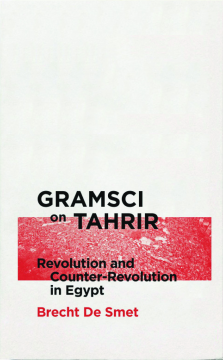
Additional Information
Book Details
Abstract
Coming in the wake of intense political and academic debate on the nature and development of the Arab Uprisings, Gramsci on Tahrir zeroes in on the complex dynamic of Egypt's revolution and counter-revolution. It shows how a Gramscian understanding of the revolutionary process provides a powerful instrument for charting the possibilities for an emancipatory project by the Egyptian subaltern classes.
Central to De Smet’s argument is Gramsci’s interpretation of ‘Caesarism’, an occasion in which two evenly matched political opponents reach a potentially catastrophic stalemate; such an interplay between these forces can only end in mutual destruction. In applying this to the Egyptian revolution, we see how the Egyptian state was bereft of strong hegemonies and the people were replete with capable counter-hegemonies. Through this analysis, we can see how the current situation in Egypt demonstrates how both national histories and global power relations enable, define and displace popular resistance and social transformation.
'A wide-ranging and innovative work that will be of invaluable use to scholars of the Middle East, revolution, and 'democratic transition' and the use of Gramscian political concepts in global political economy'
Dr. Jamie Allinson, Lecturer in International Relations, University of Edinburgh, and Editor at 'Salvage'
'An important contribution to debates which should concern us all as researchers and students of potential revolutionary transformation, of Egyptian politics and of Gramsci's political thought'
Dr. Maha Abdelrahman, Reader in Development Studies and Middle East Politics, University of Cambridge, and author of 'Egypt's Long Revolution: Protest Movements and Uprisings' (Routledge, 2014)
'This is undoubtedly one of the most interesting and provocative analyses of not only the recent Egyptian revolution'
Progress in Political Economy
Table of Contents
| Section Title | Page | Action | Price |
|---|---|---|---|
| Cover | Cover | ||
| Contents | v | ||
| Series Preface | vi | ||
| Acknowledgments | ix | ||
| Abbreviations | xi | ||
| 1. Introduction | 1 | ||
| Part I: On the Subject of Revolution | 11 | ||
| 2. From Bourgeois to Permanent Revolution | 13 | ||
| 3. A Criterion for Interpretation | 37 | ||
| 4. Caesarism | 72 | ||
| Part II: Gramsci in Egypt | 105 | ||
| 5. Passive Revolution and Imperialism | 107 | ||
| 6. Lineages of Egyptian Caesarism | 139 | ||
| 7. The 25 January Revolution | 172 | ||
| 8. Revolution and Restoration | 205 | ||
| 9. Conclusions | 224 | ||
| Notes | 230 | ||
| Bibliography | 242 | ||
| Index | 257 |
